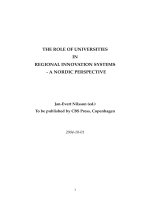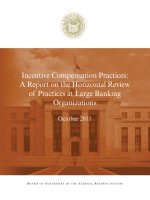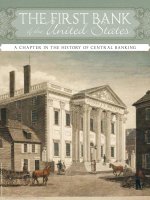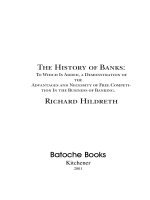the bankruptcy of india; an enquiry into the administration of india under the crown. including a chapter on the silver question (1886)
Bạn đang xem bản rút gọn của tài liệu. Xem và tải ngay bản đầy đủ của tài liệu tại đây (9 MB, 229 trang )
'.
'
f,
H-
1V1.
:
•
HYNDWIAN
:
THE
BANKRUPTCY OF
% ^mmistrata
&\x ^ttqutrg into
INDIA.
of
JnMa
mxbtx fyt (fofom.
INCLUDING
A CHAPTER ON THE
H.v
M.
AUTHOR OF " ENGLAND FOR
SILVER QUESTION.
HYNDMAN,
AiIl/J
" THE HISTORICAL BASIS OF SOCIALISM
IN ENGLAND," ETC.
LONDON
SWAN SONNENSCHEIN, LOWREY
PATERNOSTER SQUARE.
1886.
&
CO.,
Printed by Hazell, Watson,
& Viney,
Ld.,
London and Aylesbury.
PREFACE.
P^HE
-*-
three chapters in this
respectively,
"The
little
Condition
book headed
of
India,"
""Controversy," and " Bleeding to Death," appeared
as papers
in the
Nineteenth Century, between the
end of the year 1878 and the beginning of 1880.
The
title,
by the
These
"
of India," was suggested
editor of that Review, Mr.
articles
then stood.
nor the
The Bankruptcy
I
figures,
are
now
reprinted
James Knowles.
almost as they
have altered neither the arguments
because to have done so would have
changed the controversial position as against
opponents, Sir John Strachey,
Sir Erskine Perry,
Mr. John Morley, and Mr. F. Danvers.
tunately for India,
my
Unfor-
no reform of any importance
has since been made, and
my
contentions remain
wholly unshaken with regard to the period which
then dealt with.
The
I
" Introduction," the chapter
IV
PREFACE.
•
chapter on
headed "Continued Neglect," and the
"
The
for
volume.
this
It
pleasing
is
many
after
me
to
years
my
matters,
to
devoted
study
of
the
recall
fact,
to
that
Indian
opportunity for calling attention
first
what has always seemed
to
been written
have
Question,"
Silver
to
me
most im-
the
portant point in connection with our rule, was given
me
in
the Pall
Mall
Mr. Frederick Greenwood.
old friend, and enemy,
A
series of letters, entitled
India," appeared in that
in
In one of them
the
Works
Public
severely.
A
was then
sitting
newspaper signed " H."
administration
India
in
of
very
Committee of the House of Commons
to inquire into the
member
enough had been
at
Our Greatest Danger
Department
of that very department.
Fawcett, a
"
criticised the
I
my
by
Gazette, then edited
The
Mr.
late
of the Committee,
my
management
who
lecturer in Political
Henry
curiously
Economy
Cambridge, wrote to Mr. Greenwood and asked
that "
the
H
"
should offer himself as a witness before
Committee,
wrote over that
seeing
initial
that
the contributor
evidently
knew more about
the subject than most of the officials
examined.
As
I
had
who
never been
who had been
in
India,
and
PREFACE.
had acquired
my
come
to
now
urge
in the following
because
it
industrious
man
to
the arguments of the
and
;
I,
of course,
only mention
I
enforces the view which
pages,
about
evidence
of
records,
official
forward
this
plenty
almost entirely from
information
Blue Books and other
declined
v
—that
India
master the
official
there
to
already
is
enable any
and
facts,
I
meet
to
apologists successfully.
Shortly afterwards Mr. Knowles opened the pages
of the Nineteenth Century
I
my
to
articles.
can only hope that, whatever defects of matter
may be found
or style
have some
volume,
in this little
it
may
effect in directing public attention to the
irremediable mischief which must be done in India
by a continuance of our present system.
I
am
well aware that in pointing to manifest decay and
hopeless
official
where
misery,
and
literary
distinction
But
I
that
they have
have
at
done
written,
and
arguments are drawn from
reports.
To
problem
is
my
highest
to
observe
run the risk
I
and ignorance.
of presumption
least
us
tell
only improvement and prosperity,
of being accused
the
of
writers
best
read
to
nine-tenths
their
of
all
my
own works and
take the optimist view of the Indian
far
more
pleasant,
as
it
is
assuredly
PREFACE.
VI
more
profitable,
am, however, firmly convinced
I
we
are working
trophe,
1847
I
language.
plain
in
than to state disagreeable truths
up
to a hideous economical catas-
beside which
w iM seem mere
believe
that
through the
no
official
the great
these
work
to
few
Irish
Famine of
child's play.
What
unprejudiced
man
is
words,
the judgment
to
the
same
therefore,
of the
I
more,
can read
evidence summarised
volume without coming
With
India
that in
in
this
conclusion.
leave
the
public.
H. M. H.
io,
Devonshire Street,
Portland Place,
London, W.
CONTENTS.
PACK
Introduction
I.
II.
III.
The Condition of India
Controversy
Bleeding to Death
IV. Continued
V.
t
Neglect
The Silver Question
-
-
-
-
•
-
-
35
78
115
1^4
198
—
;
INTRODUCTION.
When
Englishmen speak and write of the history
of India, they too often forget what an insignificant
of
portion
conquest
and
history the
that
domination
record
of
our
Three
forms.
really
thousand years ago the nations of India were a
collection
and,
wealthy,
of
civilised peoples, with at
in
least
a
sense,
highly-
one great language,
with an elaborate code of laws and social regulations,
and
taste
and endowed
ideas and philosophic thoughts which
possessed
of
exquisite
beautiful manufactures of
with religious
have greatly
— we
still
many
scarcely
artistic
kinds,
know how
greatly
influenced the development of the most progressive
races of the West.
Perhaps the noblest teacher
and moralist that ever lived, Sakya Mouni, was a
Hindoo the Code of Menu, of the ninth century
;
before our era,
jurist as
Institutes
the
is
still
Laws
as essential a study for the
of the
of Justinian
Twelve Tables
or
the
the philosophers of India
;
men who had argued with
and Alexander Akbar, the Mahommedan,.
was the greatest monarch that ever ruled the East
while even in later times nations over whom we hold
supremacy have proved that they have among them
no unworthy descendants of the authors of the
held their
Aristotle
own even
with
;
INTRODUCTION.
2
Vedas and the Mahabharat, of the architects of the
Taj Mahal or Beejapore, of Toder Mull and
Nana Furvana, of Baber and Hyder Ali. Yet to
read nine-tenths of what has been written on Indian
life and administration of late years by Anglo-Indian
we
should almost believe that civilised
government in India began with the English Raj
that, but for our intervention, anarchy and ignorance
officials,
;
striving for mastery in the
which we have been appointed
benighted country
by Providence to rescue from its unhappy fate and
have
would
been
;
that to hand over the direct government to a
degree
greater
natives
the ablest
to
much
would
be
gross injustice to the people of India.
There
is little
basis for such contentions as these,
though they find so much favour with our Indian
bureaucracy.
never
at
It
safe to
is
say,
for
example, that
any period was the condition of India more
anarchical than that of France,
Germany, the
Low
Countries, and Italy during a great portion of the
Middle Ages. Thugs and dacoits were at no time
more dangerous or more cruel than the bands of
ecorcheurs, robbers, and freebooters who roamed at
will through some of the finest regions of Europe.
The
cases
many
demands made by
exactions of the feudal chieftains were in
worse than the heaviest
Rajahs or Nawabs
;
the dues to the Church were
certainly not less onerous
than the tithes to the
—
Nadir Shah's sack of Delhi a foreign
conqueror's revenge, by the way
was horrible but
not worse than the Constable de Bourbon's sack of
Rome. Yet he would be a bold man who should
Brahmins.
—
urge that the Pax Romana, with
;
its
blight of the
INTRODUCTION.
3
great slave-worked estates, and constant
drain
of
wealth to the metropolis, was better for the mass of
the people than even the turbulence and oppression
of the period of the Crusades.
Progress was going
now
see that what has
and we
often been called anarchy was but the commencement of a newer and more vigorous life, due to the
barbarian invasion.
It may be that our interference
checked a similar development in India, following on
the gradual break up of the Mogul Empire of Delhi.
At any rate, we have no right to claim that we have
benefited the country, until evidence has been given
that the mass of the people are really better off
under our domination than they were, or than they
are, under native rule.
That is the test of the
merit of all governments, home or foreign.
Do
they or do they not secure increased welfare for the
body of the people governed ?
There is but one way in which to answer such a
on
all
the time
can
;
question, or to learn to appreciate our true relation
and that
to India;
is
by a
careful study, without a
tinge of national prejudice, of
India and
of
To do
effectively calls
this
our
but for imagination.
to
the
connection
It
is
real
with
the
not only
difficult
history of
country.
for industry
enough
for us
comprehend another period of the history of our
own
race,
here in our
own
country, to appreciate the
different forms of production, to follow the varying
relations of social
life,
to grasp the substance of the
forms of government and administration at distant
epochs.
If this
be so with our
own
people,
how
much harder is it to enter into the national life and
development of a number of Asiatic nations bound
INTRODUCTION.
4
together for a comparatively short time under our
alien rule, but
whose growth
for
thousands of years has
gone on
in conditions so entirely dissimilar, that
needs an
effort of the
the two civilisations
Our
mind to reach the period when
had a common starting-point ?
national characteristics are not favourable to
such a comprehension as
is
really
needed
;
and, great
work done by some noble English-
as has been the
men
it
in this field,
it
needs only to
show the
cite
such a passage
drawbacks which have
to be surmounted in endeavouring to get to know
" Englishmen in India have less
the population.
opportunity than might be expected of forming
opinions of the native character.
Even in England
few know much of the people beyond their own
class, and what they do know they learn
from
newspapers and publications of a description which
as follows to
does not exist
religion
in
initial
India.
that
country,
also,
and manners put bars to our intimacy with
the natives, and limit the
well as the free
know nothing
report,
In
and
transactions, as
communication of opinions.
of the
have
occurrences of
number of
life
character are most
interior of families
no
in
share
in
those
We
but by
numerous
which the amiable parts of
exhibited.
different religion, judges,
Missionaries of a
police magistrates, officers
of revenue or customs, and even diplomatists, do
not see the most virtuous portion of a native, nor
any portion, unless when influenced by passion or
What we do
see we judge by our own standard. ... It might be
argued in opposition to many unfavourable testimonies that those who have known the Indians
occupied by some personal interest.
INTRODUCTION.
5
longest have always the best opinion of
a compliment to
this is rather
them, since
more
it is
human
them
;
but
nature than to
true of every other people.
It is
who have
retired
to the point, that
all
persons
from India, think better of the people they have
left after comparing them with others even of the
most justly-admired nations." This was written by
Mountstuart Elphinstone more than thirty years ago,
main as true now as it was then.
Again, in reference to mere taxation and administration, our difficulties of understanding, even after
an experience of a hundred years, are surely very
but
it is
great,
in the
arising
in part
out of the
very nature of
There is no more ardent admirer of the
had nearly added, and of the vices of our
rule in India than Sir Henry Maine.
Yet he says
that to him there is "the heaviest presumption
against the existence in any part of India of a form
of ownership conferring the exact rights on the
proprietor which are given to the present English
ownership in fee simple " and he shows the impossibility of arriving at any clear notion as to competitive rent in that country.
Moreover, he gives
the case.
virtues
—
—
I
;
the following admirable
summary
of the hopeless-
ness of foreigners attempting to deal practically with
that very land revenue which
of our revenue in India, as
Government
"
Do
it
is
the sheet-anchor
has been of every
country before
us.
you, on entering on the settlement of a
new
that
ruled
the
province, find that a peasant proprietary has been
displaced by an oligarchy of vigorous usurpers, and
do you think
it
expedient to take the Government
dues from the once-oppressed yeomen
?
The
result
INTRODUCTION.
6
immediate decline, and consequently bitter
discontent of the class above them, who find themis
the
mere annuitants on
Such was the land settlement of Oudh,
which was shattered to pieces by the Sepoy mutiny
Do
of 1857, and which greatly affected its course.
selves sinking to the level of
the land.
you, reversing this policy, arrange that the superior
Government
holder shall be answerable to
find
?
You
you have created a landed aristocracy
that
which has no
parallel
in
wealth or power, except
the proprietors of English
soil.
Of
this nature is
more modern settlement of the province of
Oudh only recently consummated, and such will
the
Talukdars or
Barons, among whom its soil has been divided.
Do you adopt a policy different from either of those
which I have indicated, and make your arrangeultimately
be the position of
the
ments with representatives of the village community ? You find you have arrested a process
of change which was steadily proceeding.
You
have given, to this peculiar proprietary group a
vitality which it was losing, and a stiffness to the
relations of the various classes composing it which
they never had before."*
In this brief historical sketch which is given as an
introduction to a more exact examination of our
present financial system in India, no pretence is
made therefore to do more than summarise the main
facts.
Probably more than one generation will pass
before
it
is
possible to
make
a
connection with the country and
such a survey
is
made
there
is
fair
survey of our
its results.
too
much
* Maine's "Village Communities,"
p.
When
reason to
150.
INTRODUCTION.
7
fear that the estimate of the value of our services
more nearly resemble that which we
ourselves now place on the services rendered by the
Spaniards to South America, than the exaggerated
view of the beneficence of our administration which
to India will
is
generally taken
The
first
among
attempts
us to-day.
of
the
English to establish
were made in the reign of
They were unsuccessful, nor
missions of Captain Hawkins
direct trade with India
the
Emperor Akbar.
was it until after the
and Sir Thomas Roe to the Court of Jehangir that
a factory and settlement were obtained at Surat on
favourable terms.
Akbar's reign of
fifty
years was,
most prosperous period for the
mass of the people that had been seen since the
downfall of the ancient Chalookya dynasty. This was
chiefly due to the firmness with which he maintained
his power, and to the justice and considerateness of
his taxation.
The settlement of the land revenue
was carried out by the famous Rajah Toder Mull,
though there is little doubt that the arrangements
were in existence before, and were only equitably
reduced to order by him. According to the Code
of Menu one-fifth of the produce could be taken
by Toder Mull's regulations one-third was nominally
so taken on an average of ten years.
This payment,
which had gradually come to be made in money, was
confirmed in that sense
though the proportion
might be paid in kind if the money payment were
alleged to be too onerous and the exaction was very
rarely pressed in hard times.
Where the system of
farming the revenue was the rule, both before and
in all probability, the
;
;
;
INTRODUCTION.
8
after these arrangements, a larger proportion
exacted, and in
was pushed
their lands,
some
was
exceptional cases the taxation
to such a point that the villagers left
and fled for the time, or
was established.
until
a better
state of things
Under Akbar's arrangement, with the
certain
cesses on trades and
addition of
other duties
of the
nature of an octroi, no less than ^30,000,000 were
paid annually into the Imperial treasury, nor, though
were much more oppressed and the
was much more disturbed under his
successors, is there any reason to believe that a less
sum was collected by the various emperors of the
Mogul dynasty until the great Mahratta conquests
and the break up of the empire.* For one hundred
and seventy years it is stated by competent
the people
public peace
was the lowest amount of the
Imperial revenue and when the period is taken into
consideration, as well as the large jaghires and rentfree grants given to favourites, this sum, drawn from
authorities that this
;
150,000,000 people at the outside, certainly represents a
much
larger revenue than has ever been
collected under our rule.
Nevertheless, save immediately after some outbreak or invasion, there was no evidence that the
country was impoverished while during the whole
;
period the manufactures of India were, as they had
been
for centuries before,
sought after
all
over the
* Mr. W. W. Hunter, who is paid ^3,000 a year as DirectorGeneral of the Statistical Department in Calcutta, partly in order
that he
may
act as Advocate-General of the Indian
in Edinburgh, puts Akbar's revenue at
zib's
revenue in
all
at
Government
^42, 000,000, and Aurung^80,000,000 yearly, which of course
strengthens the argument in the
text.
INTRODUCTION.
earth.
9
All the early travellers were struck
display of wealth,
and our
rising
industries
by the
were
obliged to be protected against Indian competition.
Aurungzib's renewal of the poll-tax on
Hindoos,
which had been abrogated by the wise tolerance of
Akbar, was a most oppressive measure politically,
and the system of farming the revenue again assumed
dangerous and most harmful proportions towards the
close of the dynasty but it remains true that during
;
the time that
we were
slowly working our
being merchants to conquerors,
way from
India remained a
wealthy country, with a revenue enormous
parison with that of any European State,
in
com-
and with
apparently a great power of rebound from any tem-
porary misfortune, such as a Mahratta rising or an
Afghan
Nor should we overlook the fact,
much cruelty and rapine, the rivalry
invasion.
that in spite of
of the states and rajahs, the display of native courts,
the magnificence of native architecture, gave a
and colour
to the
whole people such as
is
life
unknown
our time.
This capacity of rapid recovery from disaster,
which has been remarked before by all observers as
a striking characteristic of India in the period prior
in British India of
was undoubtedly due to the permanence of the village community. The village comto our invasion,
munity or township was the unit of early Aryan
as the gens was the unit of the social
system in the Gentile organisation of savagery
and barbarism. It formed, and in many districts still
forms, a complete organism in itself, which can be
grouped with, but never absorbed by, other similar
organisms.
The primitive communal arrangements
civilisation,
INTRODUCTION.
10
on which they were based have been handed down
from countless generations, and the manner in which
the payment of land revenue to a chosen centre arose
In its origin
can now almost certainly be traced.
the arrangement was democratic rather than monarchal.
But what concerns us is the steady prosperity and marvellous continuity of these village
communities, which were the main element of a
society where the enormous majority of the populaThorough masters of their
tion was agricultural.
own method of tillage, and well able to deal with
problems of irrigation in dry regions which our own
engineers have so far failed to grapple with successfully, they are self-supporting, and practically independent of all outsiders. These little republics have
each and all their headman, who is chiefly supported
by the community which he represents in respect to
the government, and administers in a popular way
the business of the community in regard to the
division of lands, the apportionment of water, etc.
The
accountant, the watchman, the priest, followed
by the smith, the carpenter, the barber, the potter, and
have all their places in the little society, who
are all dependent for their support upon the agriculture of the group, and hand on their avocations
others,
from father to son from generation to generation.
If another village is formed, though the extent of
territory and number of inhabitants may be different,
the same functionaries are provided
their part in
some way
all
take
communal
business.
complete
a
property,
but the whole village
is
and
absolutely no
in the
In such
case there
for,
is
responsible for
the payment, through the headman, of
its
percentage
INTRODUCTION.
I I
of revenue on the crops calculated on land of three
degrees of
nities,
fertility.
when grouped
Clearly these village
in tens or
commu-
hundreds under the
old native system, might afford fine opportunities for
plunder to a collector or zemindar of a pergunnah,
hundred was
as the group of a
of
many
instances
called.
But, in spite
of extortion, there
is
nothing
to show that the country was exhausted by the
demands made upon it, and the villages survived
the raids and misgovernment of Afghan and Patan,
Mogul, Sikh, and Mahratta, who might be masters and
conquerors for a time, but the villages
"In times of
selves
;
still
lived on.
arm and fortify themarmy passes through the country
trouble they
a hostile
;
the village communities collect their
cattle within
and let the enemy pass unprovoked. II
plunder and devastation be directed against themselves, and the force employed be irresistible, they
their walls,
flee to friendly villages at
a distance
;
but,
when
the
storm has passed over, they return and resume their
country remain for a series of years
If a
occupations.
the scene of continued pillage and massacre, so that
the villages cannot be inhabited, the scattered villagers
nevertheless return whenever the power of peaceable
A
possession revives.
generation
may
pass away,
but the succeeding generation will return.
The
sons
take the places of their fathers
same
site
will
for the village, the
same lands
those
them
;
;
the
position for the houses, the
be reoccupied by the descendants of
will
who were
depopulated
drive
same
and
out,
driven out
it
is
when
the village
was
not a trifling matter that will
for they will often maintain their
post through times of disturbance and convulsion,
2
INTRODUCTION.
1
and acquire strength
This union of the village
communities, each one forming a separate
in itself, has,
I
and
sufficient to resist pillage
oppression with success.
conceive, contributed
state
little
more than
any-
other cause to the preservation of the people of India
through
all
the revolutions and changes which they
and is in a high degree conducive to
and to the enjoyment of a great
portion of freedom and independence."*
Tyranny, lawlessness, and rapine might, in short,
reign above, while below these conservative comhave
suffered,
their happiness
munes maintained almost
unruffled the peaceful con-
Nor should
be forgotten,
that great as might be the temporary oppression
exercised by the Government, the Rajah, the Nawab,
or the Zemindar, the agricultural wealth extorted from
tinuity of their existence.
it
the villagers was at least used in the country, and ex-
pended on
as
many
retainers
of the
prior to the
and
Bad
others.
Mahommedan
in
Mogul dynasty, they at
we
Consequently
period
from the
find
first
it
might
that
English
way
were
least lived in the
country, and Nadir Shah's loot of Delhi
exceptional event, as well
every
rulers of India
was quite an
be.
during
the
acquaintance
whole
with
India through the reigns of Jehangir, Shah Jehan,
Aurungzib, and Mohammed Shah, until in the last
we began
compete with the French for
the supremacy, the records of impoverishment and
century
famine are but
to
trifling.
Here again the popular
Aurungzib
opinion is, to a great extent, incorrect.
was a powerful but harsh and bad ruler he imposed
obnoxious taxes, and ravaged with cruelty the terri;
* Sir Charles Metcalfe.
3;
INTRODUCTION.
1
who had revolted against him; the
Mahratta cavalry were no respecters of persons, and
their tribute or chout was levied upon all with complete indifference to anybody's welfare but their own
the weakness of the central power, when the Moguls
were tottering to their fall, gave functionaries in
Hyderabad, in Bengal, and other territories, opportunity to rob and fleece the inhabitants and at a later
date the Mahommedan adventurers of Seringapatam
tories of those
;
acted as seemed good in their
own eyes until they came
into collision with the English power.
all this
But through
long period of tumult and intestine war, of good
government under Akbar, and of apparent anarchy
during the Mahratta raids, the records of really
serious dearth or famine are few and far between.
Prior to the present century famine was rare in India.
Not only did the village communities and the
Government provide in numberless cases against
periods of drought and flood by storage of grain,
but even the harshest native ruler, for his own sake,
and almost as a matter of course, lessened, or even
failed to make, his demand when even trifling scarcity
threatened. Much as the method of collection might
vary, this judicious laxity may be said to have been
almost invariably practised in Native States, as
is
now.
When
it
the oppression was carried beyond
bounds insurrection against the local tyrant was still
possible, and not unfrequently successful.
From the Himalayas to Cape Comorin, and from
the slopes of
Assam
to the Persian Gulf, the agricul-
tural population, with their simple
growing up naturally out of
but beautiful
their society,
rally in a prosperous condition.
arts,
were gene-
In the great towns
INTRODUCTION.
14
Benares, Delhi, Agra,
etc.,
were to be seen wealth,
public display scarcely to be equalled
and
even at the end of the seventeenth century in Paris,
London, or Vienna. The state of the communications was bad, no doubt and as the country became
more disturbed after the great Mahratta risings and
luxury,
;
the increasing imbecility of the
Mogul
great tanks and irrigation works in
rulers,
many
the
districts
were beginning to fall into decay but India had
passed through many worse crises, and would certainly have risen above this.
With the eighteenth century began the great
rivalry between England and France in the East,
which practically involved the question as to which
should have the mastery of India.
At first glance
the odds seemed greatly against the English, for our
command of the sea was not then by any means so
complete as it afterwards became, and the French
had unquestionably greater power in the Native
Courts than the English.
But our men were backed
up more from home, they showed in emergencies
extraordinary capacity
and thus was seen the
marvellous spectacle of clerks and supercargoes
developing into generals and administrators of the
first rank, and winning an empire against fearful
•odds.
This unexampled fashion of conducting the
business of a trading company, taking possession of
.an empire as a detail of business, and waging great
wars to secure dividends for shareholders, cannot
;
;
Nothing like
the East.
It was a
here be adequately dealt with.
ever before been seen
continuation,
in
many
in
of
its
it
had
fitting
phases, of the earlier
conquests of the commercial classes of Europe.
5
INTRODUCTION.
For from the
1
began that steady withdrawal of
wealth from India to England which in one shape or
another has gone on ever since.
Throughout the
latter part of
nabob,
first
the eighteenth
who had
the pagoda-tree to
type of the rich
century, the wealthy
returned to this country after shaking
some purpose, was the
man
of yesterday.
the records of the East India
all
And
familiar
there are
Company, open
to
the world, to bear witness as to the conduct of
the fortune-hunters of that halcyon period.
India
was the El Dorado of the unscrupulous commercial
The
adventurer.
"legitimate" proceedings of the
company chartered by Queen Elizabeth and continued to our
own time were bad enough,
as the
most
strenuous supporters of that famous body must be
forced to admit.
It
was no rose-water management
which paid such enormous dividends, and drove the
stock of the shareholders to an unheard-of premium.
But the illegitimate business was infinitely worse
until checked by stern action on the part of the
Government and the directors. Even the lowest commercial
morality cannot justify the direct robbery
which pervaded every department
of our administration from the time of Clive's rise
and
rascality
power until the
Lord Cornwallis.
to
first
governor-generalship of
whether Warren
Hastings could or could not have avoided the transholding the position
actions stigmatised by Burke
which they did, it is useless to discuss whether Clive
and smaller men were entitled to be " amazed at
It
is
unnecessary
to
debate
;
their
own moderation."
individuals
counts
for
The
little
guilt or
innocence of
such
a wholesale
in
6
1
INTRODUCTION.
system of plunder
in
gross and in detail as afflicted
provinces under our immediate control,
and
Bengal and Oude, between 1757 and
What the total amount of wealth may have
1 786.
been which was transported from India to England
in one form or another during the latter half of the
last century will never be known
but that it was
something unparalleled since the great discoveries of
the
particularly
;
the sixteenth century there
is
abundant evidence to
show.
And here, before touching upon the growth of
our domination and the administrative changes by
which
fact
it
was accompanied,
that the
it
is
well to recall the
English conquered
India
with
the
Indian troops and with the aid of native alliances.
Our Sepoy army, admirably
and led, did
wonders, and turned defeat into victory on many a
hard-fought field.
The Europeans were, to use
but
Kinglake's expression, the head of the lance
they would have been quite useless without the
Of their
handle afforded by the native troops.
courage, devotion, and self-sacrifice all our generals
have spoken in the highest terms. At Plassey and
Assaye, at Wandiwash and Seringapatam, as in the
Punjab and during the astounding campaigns in
Nepaul, our native troops have shown themselves
well worthy to march side by side with the flower
of the English army and more than once, as at the
siege of Bhurtpore, have advanced to victory when
The
the Englishmen themselves had fallen back.
silly notion that we could have conquered or held
the country, but for the courage and loyalty of the
native troops and camp-followers, is a delusion of
drilled
;
;









